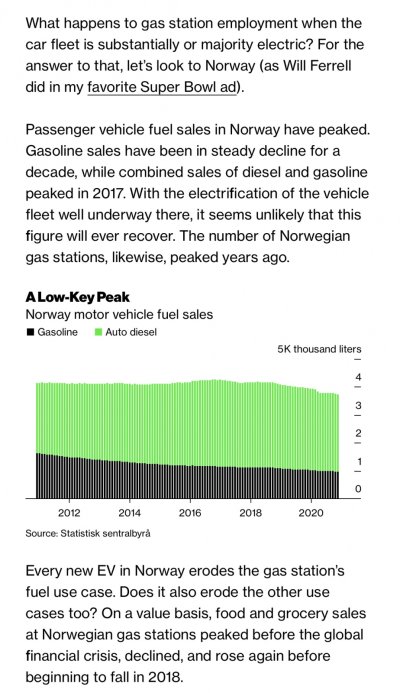ERD50
Give me a museum and I'll fill it. (Picasso) Give me a forum ...
There’s a trend emerging but how fast it plays out remains to be seen. I believe critical mass (cars on the road) will be closer to 2050 than 2030. ...
Yes, 2050 is far enough out, a lot of change could happen. But 2030 is less than 10 years, and that's a pretty short time to go from where we are to "needing luck" buy an ICE (or even a hybrid).
You are, of course, correct that no one knows with any certainty how fast the switch will occur. ...
Wait a minute, didn't you just say (well, you did, I'm quoting you):
Good luck trying to by an ICE (or even a hybrid) in 2030. ...
That sounded pretty certain to me! Are you back peddling, or just starting to see the light that some of us have been shining on the reality of this?
How many of us will still be posting here in 2030? Hard to say, but we have a prediction from oneill225 that is a bit closer in. From this old thread, posted 12-27-2018:
https://www.early-retirement.org/forums/f44/thoughts-on-tesla-86202-20.html#post2163441
oneill225 said:Those still "stuck" with ICE vehicles when no one wants to buy them will also need to deal with finding gasoline to fuel them, as the corner gas station will no longer exist.
You have a little time (5-10 years, I would guess).Quote:
Originally Posted by aja8888 View Post
Crap! I better run down to one of the 5,000 gas stations in Houston and gas up our three vehicles before they get closed! Scary stuff!
So we are already almost 3 years into his 5~10 year range of a world with no corner gas stations. Seems they ought to at least be getting harder to find by now, but I see them still being built, and I have 10 of them within a 3 mile radius. Even if 90% of them close, I won't have any problem filling up.
-ERD50


 YMMV
YMMV